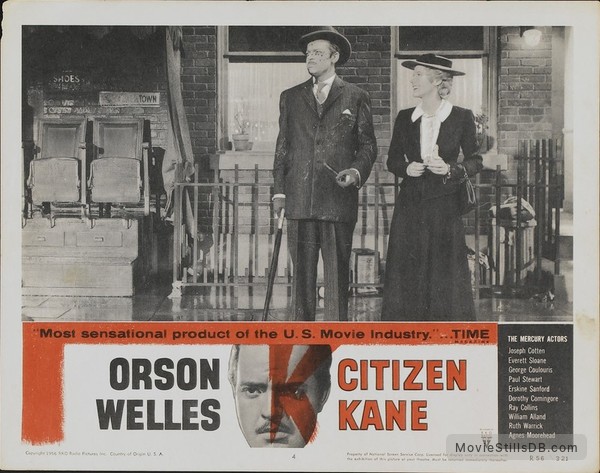Now here we are. The movie that, for decades, critics have been stereotyped as calling the best movie of all time. There is “Truth in Television”, as TV Tropes puts it.
Although Citizen Kane, thanks to whatever success Hearst had in suppressing it, was largely under the radar for a decade and a half, it was later rediscovered thanks to television. Thus, despite just missing the top 12 when Sight & Sound magazine had its first ever worldwide poll of critics and directors in 1952, in the polls taken every decade through 2002 Citizen Kane was voted the #1 movie of all time. That included the ones after critics and directors were split into separate polls in 1992. In 2012 it lost its top spot, but only to Vertigo among critics and only to 2001: A Space Odyssey and Tokyo Story among directors. Vertigo and 2001 are movies I love even more than Kane (I haven’t seen Story) so I’m not complaining.

That doesn’t change how much I love Kane though! To call it fantastic is an understatement, and it’s too bad there is that stereotype of it as something loved only by critics and pretentious twits.

Not sure why that’s the case – whether it’s because the movie’s in black and white, because people don’t think a film about a newspaper owner sounds exciting, because people erroneously think that critics only like boring art-house movies, because of some other reason, or because of some combination thereof – but in any case it couldn’t be more wrong! This is such a riveting movie that anyone can love.
I remember the first time I watched it in my History of the American Motion Picture class at UCLA. I finally got to see what all the fuss was about, and I understood it from the very first frame!

There is no theater in the world I love more.
My adoration of Citizen Kane has only grown with subsequent viewings over the years, and it was such a joy not only rewatching the movie but, for the first time, watching all the bonus features on my packed DVD for the purpose of this post!
Since I already discussed the compelling (as much as the movie) story behind the film in my previous posts, I will here focus purely on what’s onscreen.
What struck me most during this latest time watching it is how it spans every genre of cinema – and does so successfully!
Horror: I said what I said. The opening/closing shots of Xanadu and the ones with Kane and the snow globe are chilling.

Film noir: In his DVD commentary track, Roger Ebert pointed out how this film predated the entire film noir genre (except for The Maltese Falcon from the same year). I never stopped to think about that, but you absolutely can see the influence! The high contrast between light and shadow in the cinematography, the isolating shots of the main character, the dark and chilling thematic material – it all screams noir!

Political thriller: The portion of the story involving Kane and Gittes is among the movie’s best – and that’s a high bar to cross!

Musical: No, I’m not joking. This is my favorite scene in the movie:
Docudrama: The movie gets inspiration from the lives of others, including Harold McCormick and Orson Welles himself, but largely tells the story of William Randolph Hearst…

Documentary: …and ingeniously utilizes newsreel footage in the beginning! Brilliant idea to deliberately damage the footage, thereby making it look vintage!
War: Kinda pushing it but you can see in the newsreel footage of the Spanish-American War and WWI and discussion of Kane’s role in them.
Romantic drama: Not pushing it at all. The deterioration of the relationship with Emily is engrossing and the scenes involving Susan are the most powerful in the film! I should mention that, although Kane seemingly drew Hearst’s ire for basing the woefully untalented Susan on Marion Davies, and ruined Davies’s reputation in the process, I learned from Ebert’s commentary that Susan was really based on McCormick’s wife Ganna Walska, who was an opera singer, legitimately had no talent, and was nonetheless promoted to the moon by her rich husband.
Family drama: Of course, the significance of the early scene with Charlie’s parents can’t be overstated.

Period piece: It felt like a copout to choose the most generic category of just plain drama, so this felt like the best way to describe the flashbacks with Bernstein and Leland. I particularly loved every scene involving Leland, portrayed by my all-time favorite actor Joseph Cotten. Welles famously filled the movie with actors from The Mercury Theatre, his biggest claim to fame (especially for the legendary production of War of the Worlds) prior to the film. Most of them did not go on to anything that notable in Hollywood, but Cotton deservedly became one of the top leading men of the 40s!

Mystery: Just what is Rosebud?

Avant-garde: Citizen Kane 100% deserves this classification, given HOW MANY cinematic norms it broke and HOW MANY revolutionary filmmaking techniques it popularized.

Okay, maybe not EVERY genre. There is no animation, nothing in the story can be called sci-fi/fantasy, etc. Still, Citizen Kane spans more genres than any other film I’ve seen, and weaves between them so deftly and brilliantly.
Ultimately it wouldn’t mean anything if the story and the person at the center of it weren’t so damn captivating. We have a character for whom “larger than life” is a MASSIVE understatement – and we dig inside his brain and heart, all the way to the very core. The journey is astonishing.
Bottom Line: You will be absolutely RIVETED.
%

Can’t wait for the Criterion 4K disk!!! What a choice for a first UHD release.